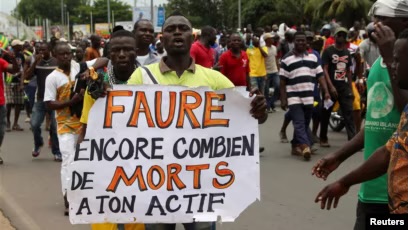Lomé, Togo – Togo’s capital descended into turmoil on Thursday as hundreds of protesters clashed with security forces over controversial constitutional reforms that many believe could allow President Faure Gnassingbé to rule indefinitely.
The unrest, which erupted in opposition strongholds like Bè, saw demonstrators erect barricades, burn tyres, and confront police with stones and other objects. The protests are the latest and most intense response to the constitutional amendments passed by Togo’s parliament earlier this year, which critics say effectively reset presidential term limits—clearing a path for Gnassingbé to remain in power well beyond 2025.
Constitutional Change Sparks National Outrage
In April 2025, Togo’s legislature passed sweeping constitutional reforms, shifting the country from a presidential to a parliamentary system. Under the new structure, executive powers will now largely reside with a president elected by parliament, not by the people—a move that opposition parties argue is a power grab in disguise.
Critics fear this allows Faure Gnassingbé, who has ruled the country since 2005 following the death of his father, Gnassingbé Eyadéma, to remain in control by becoming president under the new system—even after reaching his term limit under the old constitution.
Read Also: Nigeria Floods Claim Over 150 Lives in Mokwa, Thousands Displaced
“The people of Togo are not fools,” said one demonstrator in Lomé. “This is not democracy. This is dictatorship wrapped in legality.”
Clashes in Lomé as Police Crack Down
The protests turned violent in several parts of Lomé, particularly in Bè, a neighborhood long associated with political activism and opposition to the ruling party.
Eyewitnesses say protesters blocked roads using concrete blocks and set fires in the streets. In response, heavily armed security personnel deployed tear gas to disperse crowds. Several demonstrators were arrested during the operation.
Photos and videos circulating on social media showed chaotic scenes: people fleeing clouds of tear gas, makeshift barricades burning, and residents chanting slogans demanding an end to Gnassingbé’s rule.
Though no fatalities have been confirmed, human rights groups say they are monitoring reports of injuries and arbitrary arrests.
A Family Dynasty Under Fire
President Faure Gnassingbé has ruled Togo for 20 years, following in the footsteps of his father, who led the West African nation for 38 years. Together, the family has held power for over five decades, making the Gnassingbé dynasty one of Africa’s longest-ruling regimes.
Despite repeated calls for political reform, the government has often been accused of stifling dissent through heavy-handed security tactics, arrests of opposition figures, and restrictions on freedom of assembly.
The latest constitutional move is seen by many as a final blow to Togo’s fragile democracy.
International Reaction and the Road Ahead
As protests escalate, regional and international observers are calling for calm. The Economic Community of West African States (ECOWAS) has yet to issue a formal statement, but several civil society organizations have urged the bloc to intervene before the situation worsens.
Opposition leaders, meanwhile, are planning additional demonstrations in the coming weeks, vowing to keep up the pressure until the new constitution is repealed.
“The people will not stop until democracy is restored,” said one activist.

